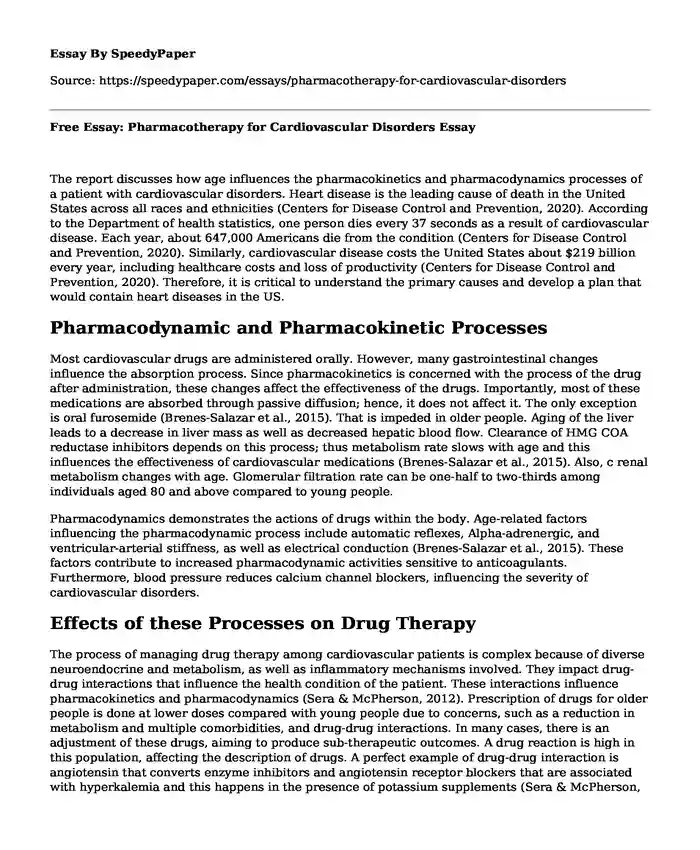
| Type of paper: | Essay |
| Categories: | Medicine Pharmacology Drug Disorder |
| Pages: | 3 |
| Wordcount: | 719 words |
The report discusses how age influences the pharmacokinetics and pharmacodynamics processes of a patient with cardiovascular disorders. Heart disease is the leading cause of death in the United States across all races and ethnicities (Centers for Disease Control and Prevention, 2020). According to the Department of health statistics, one person dies every 37 seconds as a result of cardiovascular disease. Each year, about 647,000 Americans die from the condition (Centers for Disease Control and Prevention, 2020). Similarly, cardiovascular disease costs the United States about $219 billion every year, including healthcare costs and loss of productivity (Centers for Disease Control and Prevention, 2020). Therefore, it is critical to understand the primary causes and develop a plan that would contain heart diseases in the US.
Pharmacodynamic and Pharmacokinetic Processes
Most cardiovascular drugs are administered orally. However, many gastrointestinal changes influence the absorption process. Since pharmacokinetics is concerned with the process of the drug after administration, these changes affect the effectiveness of the drugs. Importantly, most of these medications are absorbed through passive diffusion; hence, it does not affect it. The only exception is oral furosemide (Brenes-Salazar et al., 2015). That is impeded in older people. Aging of the liver leads to a decrease in liver mass as well as decreased hepatic blood flow. Clearance of HMG COA reductase inhibitors depends on this process; thus metabolism rate slows with age and this influences the effectiveness of cardiovascular medications (Brenes-Salazar et al., 2015). Also, c renal metabolism changes with age. Glomerular filtration rate can be one-half to two-thirds among individuals aged 80 and above compared to young people.
Pharmacodynamics demonstrates the actions of drugs within the body. Age-related factors influencing the pharmacodynamic process include automatic reflexes, Alpha-adrenergic, and ventricular-arterial stiffness, as well as electrical conduction (Brenes-Salazar et al., 2015). These factors contribute to increased pharmacodynamic activities sensitive to anticoagulants. Furthermore, blood pressure reduces calcium channel blockers, influencing the severity of cardiovascular disorders.
Effects of these Processes on Drug Therapy
The process of managing drug therapy among cardiovascular patients is complex because of diverse neuroendocrine and metabolism, as well as inflammatory mechanisms involved. They impact drug-drug interactions that influence the health condition of the patient. These interactions influence pharmacokinetics and pharmacodynamics (Sera & McPherson, 2012). Prescription of drugs for older people is done at lower doses compared with young people due to concerns, such as a reduction in metabolism and multiple comorbidities, and drug-drug interactions. In many cases, there is an adjustment of these drugs, aiming to produce sub-therapeutic outcomes. A drug reaction is high in this population, affecting the description of drugs. A perfect example of drug-drug interaction is angiotensin that converts enzyme inhibitors and angiotensin receptor blockers that are associated with hyperkalemia and this happens in the presence of potassium supplements (Sera & McPherson, 2012). The other example of drug-drug interactions as a result of pharmacokinetic action is digoxin toxicity and amiodarone causes these interactions.
Improving Drug Therapy
The first strategy to improve drug therapy is implementing non-adherence measures. Research shows that about 50% of cardiovascular patients do not adhere do their medications (Brenes-Salazar et al., 2015). Particularly, older patients report about 70%-80% adherence to their medication (Brenes-Salazar et al., 2015). Therefore, there should be routine checkups to ensure adherence to the drugs to improve their efficiency. The second improvement is the use of antiplatelet and anticoagulant (Ayan et al., 2016). Using these drugs would improve the health concerns of elderly people since advanced age is atherosclerotic effects.
Conclusion
The prevalence of cardiovascular disorders in the US is high causing more than 647,000 people every year. It costs a significant amount of resources to manage these conditions. Due to the increasing cases, nurses should understand risk factors, such as age, and describe appropriate medications to improve their conditions. Enhancing adherence to drug and the use of antiplatelet and anticoagulant could improve the health conditions of aged patients.
References
Ayan, M., Pothineni, V., Siraj, A., & Mehta, J. (2016). Cardiac drug therapy—considerations in the elderly. Journal of Geriatric Cardiology, 13(12): 992–99.
Brenes-Salazar, J. A., Alshawabkeh, L., Schmader, K. E., Hanlon, J. T., & Forman, D. E. (2015). Clinical pharmacology relevant to older adults with cardiovascular disease. Journal of Geriatric Cardiology: JGC, 12(3), 192–195.
Centers for Disease Control and Prevntion. (2020). Heart Disease Facts. https://www.cdc.gov/heartdisease/facts.htm
Sera, L., & McPherson, M. (2012). Pharmacokinetics and pharmacodynamic changes associated with aging and implications for drug therapy. Clin Geriatr Med, 28(2): 273–286.
Cite this page
Free Essay: Pharmacotherapy for Cardiovascular Disorders. (2023, Aug 28). Retrieved from https://speedypaper.net/essays/pharmacotherapy-for-cardiovascular-disorders
Request Removal
If you are the original author of this essay and no longer wish to have it published on the SpeedyPaper website, please click below to request its removal:
- Free Essay about Ulcer, Its Causes, Treatment and Prevention
- Free Essay Describing Cardiovascular Risks
- Paper Example. SAP Systems and ERP Systems in Health Care
- Essay Sample on COVID-19: A Highly Infectious Disease Ravaging the World
- Impulsive Teenagers: A Case Study of Personality Disorders
- Free Essay: Data Analysis Framework
- Impact of Prenatal Factors - Paper Sample
Popular categories




